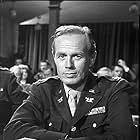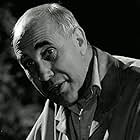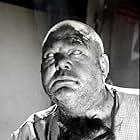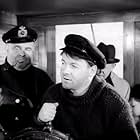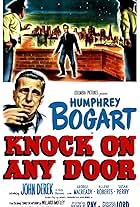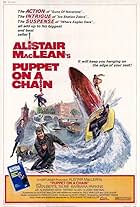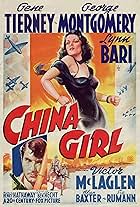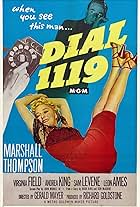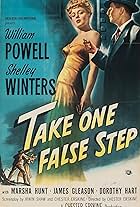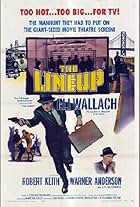During the 1956 Hungarian uprising, an American mercenary is hired to smuggle a Hungarian resistance leader out of Soviet-occupied Budapest.During the 1956 Hungarian uprising, an American mercenary is hired to smuggle a Hungarian resistance leader out of Soviet-occupied Budapest.During the 1956 Hungarian uprising, an American mercenary is hired to smuggle a Hungarian resistance leader out of Soviet-occupied Budapest.
- Language Professor
- (as Georg Köváry)
- Directors
- Writers
- All cast & crew
- Production, box office & more at IMDbPro
Storyline
Did you know
- TriviaRichard Widmark's wife, Jean Hazlewood, wrote the screenplay. It was her only screenwriting credit.
- GoofsAlthough the film is set in 1956 Hungary. The opening title of the movie is The Austrian-Hungarian Border 1960.
- Quotes
Jancsi: That would be convenient wouldn't it? You've made arrangements, certain plans to deliver me from my enemies into the hands of Herr Scheffler. You overlooked one thing only - I don't choose to leave my country.
Michael Reynolds: Sir, you don't have a choice, your time is up.
Jancsi: If that is so, Mr Reynolds, I'll die here.
Michael Reynolds: Why do you have to die? What for? I don't believe in it. Look, I came here to save your neck and I'm going to do it, even if you don't want it saved.
Jancsi: Whatever I do with my life is my own business. No one else's.
Michael Reynolds: Oh, you don't understand. In an few days you won't have a life.
The Count: We know our position better than you do.
Michael Reynolds: No, you don't! Scheffler is a pipeline. If he says I've got two days to get you out, you've got two days. Now, you can wait here like sitting ducks or you can do something. But there's a way out. If you're reasonable, you'll take it.
Jancsi: There's no profit for you, don't bother about that.
Michael Reynolds: Alright, I'm being paid. I know you'd like it better if I was some great humanitarian who believed in your cause. Well, I don't even know what your cause is.
The Count: That shouldn't surprise us.
Michael Reynolds: Well, who does outside this room? You could yell your heads off, nobody'd hear you. They aren't listening. They're all like me, I promise you; they couldn't care less. Causes are outmoded. Everybody's learned to live by compromise. Why can't you?
Jancsi: There isn't any compromise. To compromise is to doubt your own convictions. If they're worth having, they're unshakeable.
Michael Reynolds: Convictions are fine, if you live.
Jancsi: Mr. Reynolds, if I can live one day to save one person, that's enough.
Michael Reynolds: But you can do more than that on the outside. Unless you're determined to die a a martyr. And a crackpot!
1. First major film score for John Williams --at the time of writing, not even IMDb have this work on their listing of his filmography!-- yet it remains one of his strongest, most flavorful early scores. Whoever arranged and orchestrated this work with its grinding bass cello riffs and stabbing violins, they've managed to infuse an air of dark intrigue. This is then complemented with a broad melodic french horn main theme that begins immediately under the Universal International Trade Mark, sweeping you into the darkly beguiling situations that follow. If not arranged by Williams, then this could have been in the hands of Joseph Gershenson, whose name was featured as music supervisor on almost all American U.I. films during the 50-60s. Williams' composer credit is under his early calling of 'Johnny' Williams.
2. First film Produced and part directed (uncredited) by Richard Widmark
3. First film with a screenplay by Widmark's wife Jean Hazlewood.
4. First appearances in an American film for stunningly beautiful Viennese born Senta Berger, and Sonja Zieman.
5. Appears to be the first film adapted from an Alistair MacLean novel.
This film has been unfairly passed over, it was strikingly photographed on location in marvelous B/W by veteran Cinematographer Max Green...who also created the moody look to classics like; "Hatters Castle" in '42 and "Thunder Rock" also '42. Green also shot the first great noir film made by American director Jules Dasin (following Dasin's black listing in the late 40s by the House of Un-American Activities) it was the hugely atmospheric: "Night and the City" that was produced in Britain in 1950.
Award winning German actress Sonja Zieman gives a forceful performance as Julia, daughter of the professor seeking to defect to the west. The supporting cast are all first rate.
While from a story by Alistair MacLean it's not just given a simple action treatment, so this may account for other comments made by those looking for action thrills. While it does offer a couple of fanciful escape scenarios it's generally a deliberately paced, complex story involving the planned defection of pro-west refugees from Communist Hungary. As with many 60s espionage movies you may have to work hard to figure who's who and what motivates them to act in certain ways! Some of this confusion possibly came from Widmark sacking director Karlson in the last weeks of production. Perhaps this is best viewed by serious followers of the on-going after effects of WW11.
Those who enjoyed the similar 'Quiller Memorandum'('66) should also be entertained by this one. Rarely screened, and it seems quality DVDs may be difficult to find. 'The Secret Ways' remains an interesting drama for those who enjoy well made, off- beat espionage movies from the 60s. KenR.
Note: Up-Dated information: I have just purchased a DVD of this movie from Germany. It has the Universal 'studio' seal on the cover and on the disc itself. While the transfer image is quite clean it remains a little on the dark side suggesting it may have been taken from a good 35mm Composite print rather than a negative. This is better than some I've seen. It was under Cinema Classics so look for it, I ordered on-line from: DITH shop Germany.
- How long is The Secret Ways?Powered by Alexa
Details
- Runtime1 hour 52 minutes
- Color
- Aspect ratio
- 1.85 : 1
Contribute to this page







